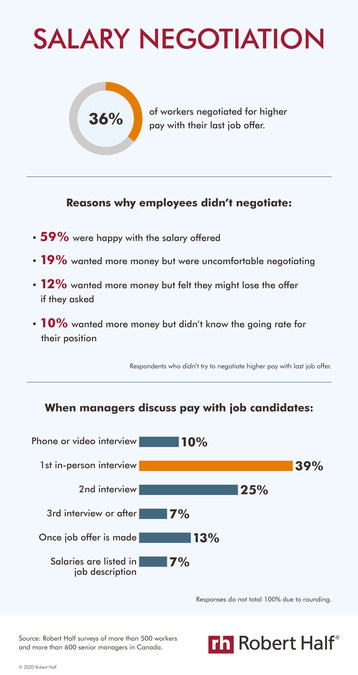How to handle a job offer negotiation in Canada?
Congratulations on receiving a job offer in Canada! Now comes the exciting part – negotiating the terms of your employment. In this article, we will guide you through the process of effectively handling a job offer negotiation in Canada. Whether you are a seasoned professional or just starting out in your career, we will provide you with valuable insights and tips to help you navigate this crucial stage. From understanding the Canadian job market to knowing your worth and effectively communicating your expectations, we have got you covered. So, let’s dive in and empower you to secure the best possible outcome for your career growth.

Researching the Job Market in Canada
Understanding the job market in Canada
Before entering into a negotiation, it is crucial to understand the job market in Canada. This includes gaining knowledge about the current demand for your skills and expertise, as well as the specific industries and regions where opportunities are thriving. By researching the job market, you can identify trends, such as which sectors are experiencing growth or decline, and tailor your negotiation strategy accordingly.
Analyzing salary trends and averages
One of the key aspects to consider when negotiating a job offer is the salary you can expect. To determine a reasonable range, it is important to analyze salary trends and averages in your field and region. Online resources and industry publications often provide salary guides and reports that can offer insights into what others in similar roles are earning. This information can help you understand market expectations and negotiate from a more informed position.
Considering regional differences in compensation
In Canada, compensation can vary significantly based on the region. Cost of living, supply and demand, and industry presence are just a few factors that influence compensation differences across provinces and cities. Understanding these regional nuances is crucial in negotiating a fair salary. Researching and accounting for these variations will help ensure that your negotiations are in line with local expectations and realities.
Preparing for Negotiation
Assessing your own worth and value
Before entering into a negotiation, it is essential to assess your own worth and value in the job market. Reflect on your qualifications, experience, and unique skills that make you valuable to potential employers. This self-reflection will help you determine your market worth and set realistic expectations for your negotiation.
Identifying your desired salary range
In preparation for a negotiation, it is important to identify your desired salary range. Consider your financial obligations, personal goals, and the value you bring to the organization. By establishing a range that aligns with your needs and market standards, you can confidently negotiate a fair and desirable salary.
Determining additional benefits and perks
Salary is not the only factor to consider during a negotiation. Take the time to think about additional benefits and perks that are important to you, such as health insurance, retirement plans, flexible working arrangements, or professional development opportunities. These non-monetary benefits can significantly enhance your overall compensation package and contribute to your job satisfaction.

Understanding Canadian Workplace Culture
Emphasizing collaboration and teamwork
In Canada, workplace culture often emphasizes collaboration and teamwork. Employers value employees who can work effectively in teams, demonstrate strong communication skills, and actively contribute to the collective success of the organization. Understanding and reflecting this cultural emphasis in your negotiation can help demonstrate your fit within the company’s goals and values.
Balancing assertiveness and politeness
Canadian workplace culture places a strong emphasis on politeness and respect. It is essential to balance assertiveness with politeness during a negotiation. Clearly and confidently express your needs and desires while maintaining a respectful tone. Being mindful of cultural expectations can help foster a positive and productive negotiation process.
Appreciating diversity and inclusion
Diversity and inclusion are fundamental principles in Canadian workplace culture. Employers value individuals who appreciate and celebrate diversity, as it fosters creativity, innovation, and collaboration. During a negotiation, be sure to highlight any experiences or skills that demonstrate your ability to contribute to a diverse and inclusive work environment.
Initiating the Negotiation Process
Expressing your interest in negotiation
Once you have received a job offer, it is important to express your interest in negotiation. Thank the employer for the offer and let them know that you would like to discuss the terms further. This demonstrates your enthusiasm for the position while also opening the door for a negotiation conversation.
Requesting a meeting or conversation
To initiate the negotiation process, request a meeting or conversation with the employer or hiring manager. This allows for a more in-depth discussion and ensures that both parties have the opportunity to ask questions, clarify expectations, and negotiate the terms of the offer.
Setting a positive tone for the negotiation
From the beginning of the negotiation process, it is essential to set a positive tone. Remain professional, respectful, and open-minded throughout the discussion. Emphasize your genuine interest in the position and your desire to find a mutually beneficial agreement. This positive and cooperative attitude can contribute to a successful negotiation outcome.
:max_bytes(150000):strip_icc()/how-to-negotiate-accept-or-decline-a-job-offer-2061398-final-c764bc7d605d43e5951da66837c89422.png)
Negotiating Salary and Compensation
Highlighting your skills and qualifications
During the negotiation, it is important to highlight your skills and qualifications that make you uniquely valuable to the organization. Provide specific examples of past achievements and experiences that demonstrate your ability to excel in the role. By showcasing your strengths, you can justify your worth and strengthen your negotiation position.
Presenting a reasoned case for salary increase
When negotiating salary, it is crucial to present a reasoned case for why you deserve an increase. Consider factors such as your experience, industry standards, and the value you bring to the organization. Use concrete examples and data to support your case, showing the employer the tangible benefits they gain by investing in your skills and expertise.
Negotiating non-monetary benefits
Remember that negotiations are not solely focused on salary. Use the opportunity to negotiate for non-monetary benefits that are important to you. This could include additional vacation time, flexible working hours, or professional development opportunities. By expanding the negotiation beyond salary, you can create a more comprehensive compensation package that aligns with your needs.
Considering Counteroffers
Evaluating the pros and cons of counteroffers
When faced with a counteroffer, it is essential to carefully evaluate the pros and cons. Consider the potential benefits of accepting the counteroffer, such as a higher salary or better benefits package. However, also reflect on the reasons you were initially searching for a new job and the long-term implications of accepting the counteroffer. Thoroughly weighing these factors will guide your decision-making process.
Assessing the feasibility of counteroffers
While considering counteroffers, it is important to assess their feasibility. Evaluate the practicality of the counteroffer in terms of the organization’s budget, structure, and long-term plans. Understanding the feasibility of the counteroffer will help you make an informed decision and determine whether it aligns with your goals and expectations.
Understanding your priorities and goals
Ultimately, when considering counteroffers, it is crucial to understand your priorities and goals. Reflect on what matters most to you in terms of career growth, work-life balance, and overall job satisfaction. By aligning your decisions with your values and long-term goals, you can navigate the counteroffer process more effectively.

Navigating Legal and HR Regulations
Understanding employment laws and regulations
Before entering into any negotiation or accepting a job offer, familiarize yourself with relevant employment laws and regulations in Canada. This includes understanding your rights as an employee, the minimum wage requirements, and any other legal considerations that may impact your negotiation process. By being knowledgeable about the legal framework, you can protect your rights and ensure fair treatment.
Consulting with a legal professional if necessary
If you have concerns or questions regarding legal aspects of the negotiation process, it may be beneficial to consult with a legal professional. An employment lawyer or legal advisor can provide guidance and ensure that you fully understand your rights and obligations. Their expertise can be particularly valuable when reviewing employment contracts or addressing sensitive legal matters.
Reviewing documentation and contracts
Thoroughly review any documentation and contracts involved in the negotiation process. Pay close attention to the terms and conditions, including salary, benefits, termination clauses, and non-disclosure agreements. If you have any questions or concerns, seek clarification from the employer or legal professionals to ensure that you fully understand the terms before making any commitments.
Maintaining Professionalism and Respect
Communicating effectively and clearly
Throughout the negotiation process, it is important to communicate effectively and clearly. Be concise and articulate in expressing your needs, interests, and concerns. Use active listening skills to understand the employer’s perspective and respond thoughtfully. By demonstrating effective communication, you can build trust and foster mutual respect during the negotiation.
Actively listening to the employer’s perspective
In addition to effectively communicating your own needs, it is equally important to actively listen to the employer’s perspective. Pay attention to their concerns, priorities, and constraints. By understanding their viewpoint, you can tailor your negotiation strategy and find mutually beneficial solutions that address both parties’ interests.
Finding common ground and compromise
Negotiations often require finding common ground and compromise. Look for areas of agreement and shared goals, and focus on building mutually beneficial solutions. Identify elements that both parties value and explore opportunities for compromise. By approaching the negotiation with a collaborative mindset, you can increase the chances of reaching a favorable outcome.

Following Up after Negotiation
Expressing gratitude for the opportunity
After a negotiation, it is important to express gratitude for the opportunity, regardless of the outcome. Thank the employer for their time, consideration, and willingness to engage in the negotiation process. This displays professionalism and leaves a positive impression, which can influence future interactions and professional relationships.
Summarizing the agreed-upon terms in writing
To ensure clarity and avoid misunderstandings, summarize the agreed-upon terms in writing. Use a formal email or letter to list the key points of the negotiation, including salary, benefits, start date, and any other relevant details. This written summary serves as a reference for both parties and helps establish a clear understanding of the agreed-upon terms.
Preparing for the next steps in the hiring process
Following a negotiation, it is important to prepare for the next steps in the hiring process. Whether you have accepted the job offer or are still awaiting a decision, stay organized and informed about the next actions required. This may include signing contracts, submitting additional documentation, or preparing for the onboarding process. By being proactive and prepared, you can smoothly transition into your new position or continue exploring other opportunities.
Handling Rejections and Multiple Offers
Reacting gracefully to a rejected offer
In the event of a rejected offer, it is crucial to react gracefully and professionally. Express your gratitude for the opportunity and remain open to future possibilities. Reflect on any feedback provided by the employer and use it as an opportunity for self-improvement. Maintaining a positive attitude and respectful demeanor, even in the face of rejection, can preserve relationships and leave a favorable impression for future opportunities.
Navigating multiple offers and decisions
When faced with multiple job offers, navigating the decision-making process can feel overwhelming. Take the time to carefully compare and evaluate each offer, considering factors such as salary, benefits, work-life balance, career growth opportunities, and cultural fit. Prioritize your needs and goals, and seek advice from trusted mentors or professionals if necessary. Ultimately, trust your instincts and choose the offer that aligns best with your long-term aspirations.
Maintaining professional relationships
Throughout the negotiation process, it is essential to maintain professional relationships, regardless of the outcome. Treat everyone involved with respect and kindness, even if you decline an offer or choose another opportunity. Professional relationships can be valuable assets in your career, and maintaining positive connections may open doors for future collaborations or opportunities.







